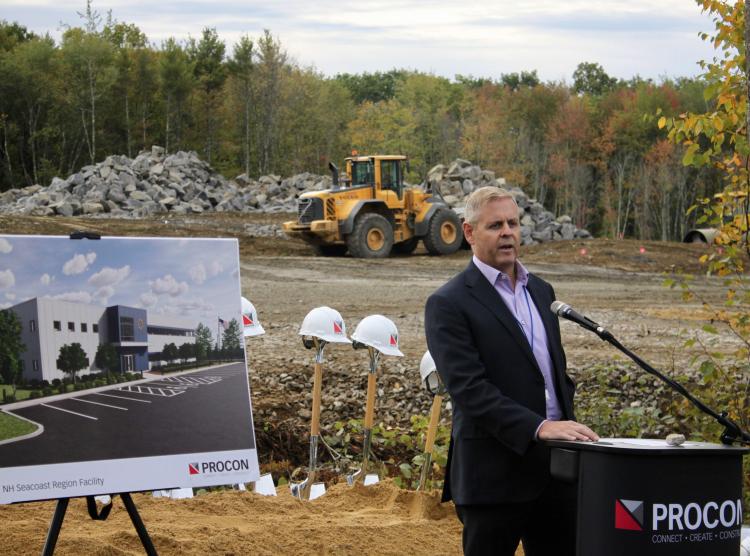Unitil CEO Tom Meissner
 Unitil CEO Tom Meissner, shown here at the 2019 groundbreaking for the company’s new operations center and headquarters in Exeter, a giving it a multipurpose, centralized location that ‘optimizes our day-to-day operations, which is important because as a utility our services are essential.’ (Seacoastonline photo)
Unitil CEO Tom Meissner, shown here at the 2019 groundbreaking for the company’s new operations center and headquarters in Exeter, a giving it a multipurpose, centralized location that ‘optimizes our day-to-day operations, which is important because as a utility our services are essential.’ (Seacoastonline photo) In October 2019 when Unitil, the New Hampshire-based electricity and natural gas distributor, broke ground on a new operations center and headquarters in Exeter, the company could not have known the challenges that would arise during the 15 months of its construction.
When the coronavirus pandemic upturned the country a year ago, Unitil was as prepared as any company with an internal task force drawing on existing disaster preparedness plans and making new ones on the fly. The company had planned for many employees being simultaneously sick, but as everybody learned together, it had not planned for what happened.
“We didn’t foresee social distancing, quarantining and remote working from home,” said Tom Meissner, the CEO, president and chair of Unitil.
Yet, a year into the pandemic, Unitil recently celebrated the opening of its $17 million, 54,000-square-foot facility in Exeter. Meissner said the new facility merges both the importance of state-ofthe-art daily and emergency response operations — which has already been put to use with winter storms in February and early March — and its commitment to long-term sustainability.
Meissner, an MBA graduate of the University of New Hampshire, joined Unitil in 1994 and has served as vice president and chief operating officer until serving as CEO since April 2018.
The company has more than 190,000 residential and commercial customers in New Hampshire, Massachusetts and Maine.
Q. How does your new operations facility fit into your future sustainability initiatives?
A. This building was designed to address many different needs and represents a significant multipurpose opportunity. The central location optimizes our day-to-day operations, which is important because as a utility our services are essential.
We have our forestry, operations and electric dispatch teams in one location, while at the same time there was a heavy sustainability focus to improve efficiency, lower costs and protect our environment.
Q. General Motors recently announced it will no longer produce gasoline cars by 2035. How will such a trend toward plug-in-at-home electric vehicles impact distribution utilities like Unitil?
A. We are setting the foundation for sophisticated, state-of-the-art services and technologies to meet these rapidly evolving needs. We are not in the electricity generation business, but we want to enable customers to take advantage of all the technologies such as solar panels, energy storage or plug-in electric cars.
Q. Advancing the grid is one of the main initiatives in your 2020 sustainability report. What exactly does it mean?
A. There are two ways we think of our own environmental impact as an electric and gas distribution company: our own carbon footprint as an energy company and to assist in the transition to decarbonize the electricity supply. It includes investing in zero-emission vehicles and technological advances to be incorporated into the grid.
Our vision is to ensure safety, reliability and energy affordability to the public. Advancing the grid is to be more intelligent and offer greater choices to consumers to meet and manage their own energy needs. We are determined to remain the most technologically advanced utility in New England.
I believe that in the 21st century flexibility will be the key — as an engineer, it’s not boring but quite exciting.
Q. How did Unitil prepare to operate during the pandemic?
A. Our task force started meeting early last year when we understood what this virus might do. They did all the heavy lifting and met dozens of times. They represented all areas of operations in the company. All the recommendations they gave were tremendous and helped us meet all our responsibilities and keep our employees safe.
We’ve always had a pandemic response plan to ensure that we kept our services running. The original response plan was how to handle operations if many employees were ill. We never considered social distancing or self-quarantining and had to completely change how we thought, how one exposure in a department could infect many others. Strategically, we were technologically well placed for our employees to work from home. When the lockdowns started, we already had people working remotely from home.
It has been a tough year dealing with the isolation, working from home and handling home schooling. Despite the mental fatigue, we kept our best customer satisfaction rating in the Northeast and remained best in safety and emergency response. We didn’t just survive, we excelled. We have a tremendous, special group of employees.